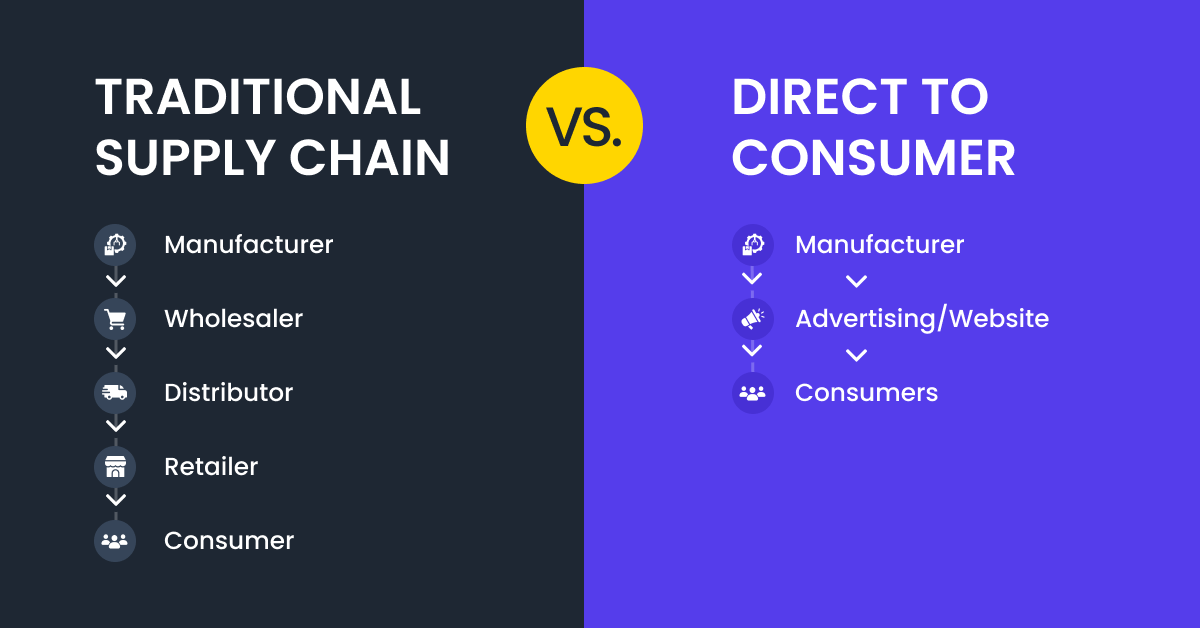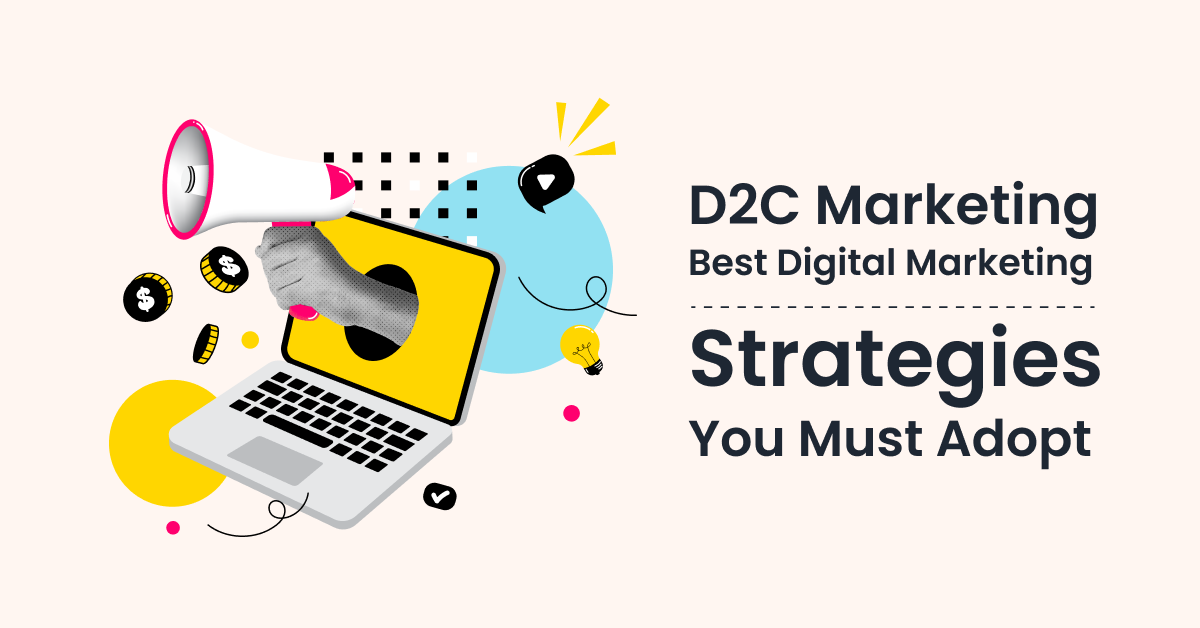Introduction:

Many retail brands today are embracing Direct-To-Consumer (D2C) marketing as a powerful way to sell directly to their audiences. By bypassing traditional retail channels, D2C brands are creating direct relationships with consumers, capturing valuable data, and driving personalized experiences. Brands like Nike, L’Oreal, and Dollar Shave Club are leading the charge, proving that D2C marketing offers unique benefits for businesses and consumers alike. Let’s dive into the core components, strategies, and advantages of a successful D2C marketing strategy and explore how it can unlock new growth avenues for your brand.
What is D2C Marketing, and How Does it Differ from Traditional Retail?

Direct-to-consumer (D2C) marketing is a strategy where brands sell products directly to consumers, cutting out the intermediaries like distributors and retailers. With D2C, brands have complete control over product manufacturing, marketing, and distribution, which allows them to engage directly with their customers. By focusing on digital channels such as websites, apps, and social media, D2C brands can streamline the shopping experience and build customer loyalty.
How Can D2C Marketing Increase Profit Margins and Sales?

One of the primary advantages of direct selling is the ability to increase profit margins by removing third-party fees and markups. By selling directly to customers, D2C brands retain a larger share of revenue per sale, allowing them to reinvest in customer experience and innovation. For instance, Nike’s D2C efforts during Black Friday drove a significant increase in digital sales, showing how a direct approach can boost revenue.
Statistic: Direct-to-consumer eCommerce sales in the U.S. are projected to increase by 42%, from $128 billion in 2021 to $182 billion by the end of 2023.
How Do D2C Brands Build Stronger Consumer Relationships?
Direct interactions with consumers enable brands to gather valuable first-party data, leading to enhanced personalization and customer loyalty. With D2C, brands can create segmented campaigns and tailor recommendations based on purchase behavior, which improves conversion rates and increases customer lifetime value (LTV). L’Oreal’s Color&Co, for example, uses data to customize hair dye kits and provides online consultations, creating a unique and engaging experience.
Best Practice: Use a CRM system to consolidate customer data across channels, helping build a 360-degree customer view and enhancing personalization efforts.
What D2C Strategies Drive Customer Retention?
Successful D2C brands understand that building loyalty is key to sustained growth. From loyalty programs to exclusive offers, many brands focus on keeping customers engaged post-purchase. Some top strategies include:
- Personalized Offers: Tailor discounts and recommendations based on past purchases.
- Loyalty Programs: Reward repeat customers and encourage referrals.
- Exclusive Access: Provide early access to new products for loyal customers, as seen in Warby Parker’s exclusive collections.
- Benefit of direct selling: Direct selling models encourage repeat purchases, as customers appreciate personalized, exclusive offerings.
What Role Does Social Media and Influencer Marketing Play in D2C?
Social media is a vital channel for D2C brands to connect directly with consumers. Influencer marketing is particularly effective for D2C because it brings authenticity and reach. Brands like Sugar Cosmetics leverage platforms like Instagram and TikTok to create shareable content and connect with micro-influencers, driving brand awareness and engagement at a relatively low cost. As a new brand, you can adopt this strategy to reach out to customers. To further enhance your Instagram marketing, consider options to get Instagram followers to boost your brand visibility.
Case Study: Gymshark’s use of influencer marketing was instrumental in turning it into a global $500 million brand.
Why is SEO Crucial for D2C Brands?

With D2C marketing, brands depend heavily on their online presence to attract and convert customers. Optimizing for search engines ensures that a brand’s website and products are easy to find. SEO isn’t about driving traffic to your site – it’s about attracting qualified, high-intent visitors who are most likely to convert.
For D2C brands, organic search can be a significant lever in cutting customer acquisition costs and fostering brand loyalty. Take a deeper look into why SEO matters for D2C brands –
- Building Authority: SEO helps brands out by building authority through high-quality content and backlinks, fostering trust and driving repeat purchases.
- Better UX & Higher Conversions: Google favors sites with fast load times and seamless navigation. A good UX not only improves rankings but also boasts conversions by making it easier for users to find what they need.
- Long-Term ROI: Unlike paid ads, SEO delivers lasting results over time, reducing the need for continuous ad spend and providing sustainable growth.
- Search Intent & Product Discovery: SEO targets users based on search intent, helping customers find your products when they are ready to buy. This is crucial for D2C brands which have niche offerings.
- Optimizing for Voice & Local Search: With voice search growing, optimizing for natural, conversational queries can help capture local audiences searching for specific products.
- Content Marketing Synergy: SEO helps brands create content that resonates with their audience. Whether blog posts or product tutorials, your content can rank while enhancing your brand’s narrative.
- Beyond Keywords: Optimizing product pages with schema markup, user-generated content, and rich media improves visibility and engagement, driving higher rankings.
Best Practices:
- Advanced SEO Tools: Use platforms like Ahrefs or SEMrush for deep competitor analysis and SEO audits.
- Content Clusters: Build topic clusters around key themes like “Skin Care” for beauty brands. This helps with better ranking and more organic traffic.
How Can Brands Enhance Customer Experience Through Data?
D2C brands have access to rich, first-party data, allowing them to understand and respond to consumer needs more effectively. By centralizing this data, brands can create targeted campaigns, test personalized recommendations, and even optimize pricing models. This data-driven approach builds a seamless customer journey and increases satisfaction.
How Does Direct-to-Consumer Marketing Benefit Consumers?
The benefits to consumers in the D2C model are numerous:
- Better Prices: D2C often provides lower prices as it bypasses retailer markups.
- Exclusive Products: Many brands offer unique or limited products only through their direct channels.
- Personalized Shopping Experience: Consumers benefit from targeted recommendations and offers that cater to their preferences, fostering a more satisfying shopping experience.
Best Practices for Implementing a D2C Strategy
- Prioritize Customer Data: Use CRM and analytics tools to gather and analyze consumer data.
- Build a Strong Brand Identity: Establish a compelling story that resonates with your audience.
- Adopt Omnichannel Strategies: Meet consumers on their preferred platforms for a seamless experience.
- Invest in SEO: Drive organic traffic with strong SEO practices, targeting keywords that align with consumer search intent.
- Leverage Influencers and UGC: Use influencers to build trust and reach, and encourage customers to share their experiences.
Conclusion and CTA:
To build a successful D2C brand, focusing on direct, meaningful connections with consumers is key. By embracing data-driven personalization, optimizing digital touchpoints, and fostering brand loyalty, D2C brands can create standout experiences that drive engagement and growth. Implementing these strategies can help your brand resonate with consumers, ensuring long-term loyalty and measurable success.
Platforms like WebEngage offer comprehensive solutions to enhance your D2C marketing efforts. With features such as customer data platforms, omnichannel engagement, and personalized communication, WebEngage enables brands to understand consumer behavior and tailor interactions accordingly. By leveraging such tools, you can streamline your marketing processes and deliver personalized experiences that foster customer loyalty and drive growth.
Take the next step toward strengthening your D2C presence—implement these strategies and consider utilizing platforms like WebEngage to transform your brand’s direct-to-consumer efforts into measurable success.
FAQ Section
Q1: What is D2C marketing?
A: D2C marketing is when brands sell products directly to consumers, skipping traditional retail stores.Q2: Why are brands adopting a D2C model?
A: Brands gain direct customer relationships, capture valuable data, and improve profit margins.Q3: What businesses benefit most from D2C?
A: D2C works well for fashion, beauty, electronics, and wellness brands that sell online.Q4: What are the core parts of a D2C strategy?
A: Key parts include personalization, SEO, customer engagement, and data-driven insights.Q5: How does D2C improve profit margins?
A: D2C eliminates middleman fees, allowing brands to retain more revenue per sale.Q6: What retention strategies work best for D2C brands?
A: Loyalty programs, personalized offers, and exclusive access to products keep customers engaged.Q7: Why is SEO important for D2C?
A: SEO drives organic traffic, helping customers find the brand’s website and boosting sales.Q8: What role does social media play in D2C?
A: Social media builds brand awareness and lets brands connect directly with consumers.Q9: How can brands personalize the D2C experience?
A: Brands use customer data to tailor recommendations and create targeted campaigns.Q10: How do D2C brands use customer data effectively?
A: Data helps brands segment audiences, personalize marketing, and improve customer journeys.Q11: What tools help manage D2C customer data?
A: Platforms like WebEngage, CRM systems, and analytics tools help streamline data use.Q12: How does WebEngage support D2C brands?
A: WebEngage enables personalized messaging, omnichannel engagement, and customer insights.Q13: Why is first-party data valuable for D2C brands?
A: First-party data allows accurate profiling and better personalization, maintaining customer privacy.Q14: What are some best practices for launching a D2C brand?
A: Know your audience, build a strong brand, focus on digital channels, and use customer feedback.Q15: How can D2C brands improve customer satisfaction?
A: Through quality service, fast shipping, personalized experiences, and responsive support.Q16: How do loyalty programs benefit D2C brands?
A: They encourage repeat purchases, increase lifetime value, and foster brand loyalty.Q17: What are common D2C challenges?
A: Challenges include logistics, data management, and competing with retail giants.Q18: How do D2C brands create seamless experiences?
A: By optimizing websites, personalizing products, and providing consistent communication.Q19: What exclusive offers work for D2C?
A: Early product access, loyalty discounts, and limited-edition items are popular offers.Q20: How does a strong brand identity help D2C?
A: It creates an emotional connection, builds trust, and differentiates the brand.Q21: What trends are emerging in D2C marketing?
A: Trends include live shopping, sustainability, AI personalization, and privacy-focused data use.Q22: How are D2C brands handling increased competition?
A: By creating niche products, improving customer experiences, and using data insights.Q23: What is the future of D2C marketing?
A: The future includes more personalized, seamless shopping experiences powered by data.








 Vanhishikha Bhargava
Vanhishikha Bhargava

 Prakhya Nair
Prakhya Nair
